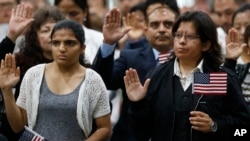The United States will cap the number of refugee admissions in the coming year at 30,000, President Donald Trump announced Thursday, an anticipated move by his administration that refugee advocates had lobbied against in recent weeks.
The refugee ceiling for the 2019 fiscal year will be the lowest in the history of the program, which in recent years saw 60,000 to nearly 90,000 refugees arrive in the country annually.
"We are troubled by this decision to further limit America's role in offering protection to those who need it most," said Kay Bellor, vice president for programs at Lutheran Immigration and Refugee Service (LIRS), one of the leading resettlement agencies in the country. "The United States is capable of far more than this."
For three decades, the U.S. was the leading resettler of refugees the United Nations determined could not safely stay in their country of asylum, or return to their home country. Canada and Australia trailed at a sizable distance until Trump took office.
He and his cabinet implemented a series of policy decisions that chipped away at the country's refugee program, cutting the cap from 110,000 during the last year of President Barack Obama's tenure, to 45,000 in 2018, and now to 30,000 for the fiscal year that began Oct. 1.
Trump insisted that additional security measures were needed for refugees, and added extra vetting for those from certain countries. Since then, the number of arrivals dropped. In FY 2018, the U.S. accepted 22,491 refugees — less than half of the proposed ceiling.
Evidence-based data does not support the idea that there is an increased security risk posed by refugees selected for resettlement to the U.S.
Before the State Department announced its intent to resettle a maximum of 30,000 refugees this fiscal year, advocates lobbied lawmakers on Capitol Hill to push for 75,000.
The required consultation between Congress and Secretary of State Mike Pompeo on Monday was unsuccessful in budging the Trump administration on the cap.
The regional allocations for FY 2019, according to Thursday's presidential determination, are:
Africa — 11,000
East Asia — 4,000
Europe and Central Asia — 3,000
Latin America/Caribbean — 3,000
Near East/South Asia — 9,000




